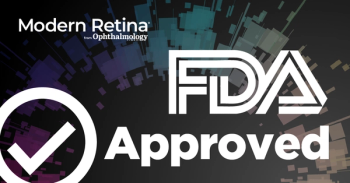
Study: AI–driven eye exams boost screening rates for youth with diabetes
According to researchers at Johns Hopkins Children’s Center, AI-driven cameras take images of the back of the eye and require no eye drops can be used to close care gaps.
A study of children and youth with diabetes conducted by the Johns Hopkins Children’s Center has found that autonomous artificial intelligence (AI) diabetic eye exams increase completion rates of screenings designed to prevent potentially blinding diabetes eye diseases (DED).
During the exam, pictures are taken of the backs of the eyes without the need to dilate them, and AI is used to provide an immediate result.
According to a news release,1 the research study noted the AI-driven technology used in the exams may close “care gaps” among racial and ethnic minority youth with diabetes, populations with historically higher rates of DED and less access to or adherence with regular screening for eye damage.
In a report on the study published this month in Nature Communications,2 researchers reviewed diabetic eye exam completion rates in people under age 21 with type 1 and type 2 diabetes, and found that 100% of patients who underwent AI exams completed the eye assessment.
According to the researchers, retinopathy affects between 4% and 9% of youth with type 1 diabetes, and 4% to 15% of youth with type 2 diabetes. About 238,000 children, adolescents, and young adults under age 20 are estimated to have been diagnosed with diabetes, according to the American Diabetes Association.3 Patients can undergo regular screenings for DED to drive early detection and treatment and can help prevent progression of DED.
Generally, diabetes specialists and ophthalmologists recommend annual screenings, which typically require an additional, separate visit to an eye care provider, such as an optometrist or ophthalmologist, and the use of drops to dilate the pupil so that a clear view of the retina is visible through specialized instruments. However, research indicates that only 35% to 72% of youth with diabetes undergo recommended screenings, with even higher care gap rates among minority and poor youth. Previous studies also show that barriers to screenings include confusion about the need for screenings, inconvenience, and lack of time, access to specialists and transportation.1
Recent studies by Risa Wolf, MD, a pediatric endocrinologist at Johns Hopkins Children’s Center, and her colleagues have uncovered autonomous AI screening that uses cameras produce results that enable accurate DED diagnosis.
In the new study,1 researchers enrolled 164 participants, ranging in age from 8 to 21 years, all from the Johns Hopkins Pediatric Diabetes Center, between Nov. 24, 2021, and June 6, 2022. Some 58% were female and 41% were from minority groups (35% Black; 6% Hispanic). Some 47% of participants had Medicaid insurance. The subjects were randomly assigned to one of two groups. A group of 83 patients received the standard screening instructions and care, and were referred to either an optometrist or ophthalmologist for an eye exam. A second group of 81 patients underwent a five-to-10-minute autonomous AI system diabetic eye exam during a visit to their endocrinologist (the specialists who typically care for people with diabetes) and received their results at the same visit.
The researchers noted the AI system takes 4 pictures of the eye without dilation and runs the images through an algorithm that determines the presence or absence of diabetic retinopathy, Wolf explained. If it is present, a referral is made to an eye doctor for further evaluation.
If it is absent, “you’re good for the year, and you just saved yourself time,” she pointed out.
According to the news release, researchers found that 100% of patients in the group offered the autonomous AI screening completed their eye exam that day, while 22% of patients from the second group followed through within 6 months to complete an eye exam with an optometrist or ophthalmologist. The researchers found no statistical differences based on race, gender or socioeconomic status for whether participants in the second group scheduled the separate screening with an eye doctor.
Moreover, according to the release, the research team found 25 out of 81 participants, or 31%, in the autonomous AI group had a result indicating that DED was present.
“With AI technology, more people can get screened, which could then help identify more people who need follow-up evaluation,” Wolf noted in the release. “If we can offer this more conveniently at the point of care with their diabetes doctor, then we can also potentially improve health equity, and prevent the progression of diabetic eye disease.”
The researchers also pointed out the autonomous AI used in their study is not approved by the US Food and Drug Administration for those under 21 years old. The note a potential source of bias in the study was that some of the participants were familiar with autonomous AI diabetic eye exams from a prior study, and therefore may have been more willing to participate in the new one.
In addition to Wolf, the study authors from Johns Hopkins include Alvin Liu, Anum Zehra, Lee Bromberger, Dhruva Patel, Ajaykarthik Ananthakrishnan, Elizabeth Brown, Laura Prichett and Harold Lehmann. Other authors are Roomasa Channa from University of Wisconsin and Michael D. Abramoff from the University of Iowa. The authors associated with Johns Hopkins University declared no conflicts of interest related to the content of the news release.
The study was funded by the National Eye Institute of the National Institutes of Health and the Diabetes Research Connection, according to the news release.
References:
1. Study Finds AI–Driven Eye Exams Increase Screening Rates for Youth with Diabetes. www.hopkinsmedicine.org. https://www.hopkinsmedicine.org/news/newsroom/news-releases/2024/01/study-finds-ai-driven-eye-exams-increase-screening-rates-for-youth-with-diabetes
2. Wolf, R.M., Channa, R., Liu, T.Y.A. et al. Autonomous artificial intelligence increases screening and follow-up for diabetic retinopathy in youth: the ACCESS randomized control trial. Nat Commun 15, 421 (2024). https://doi.org/10.1038/s41467-023-44676-z
3. American Diabetes Association. Statistics About Diabetes | ADA. diabetes.org. Published 2023. https://diabetes.org/about-diabetes/statistics/about-diabetes
Newsletter
Keep your retina practice on the forefront—subscribe for expert analysis and emerging trends in retinal disease management.




























